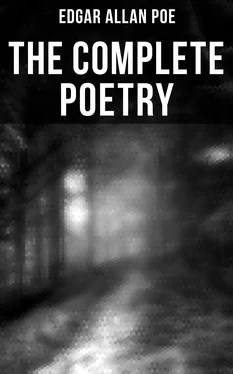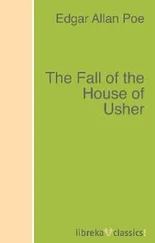1 ...6 7 8 10 11 12 ...27 That shift the scenery to and fro,
Flapping from out their Condor wings
Invisible Wo!
That motley drama—oh, be sure
It shall not be forgot!
With its Phantom chased for evermore,
By a crowd that seize it not,
Through a circle that ever returneth in
To the self-same spot,
And much of Madness, and more of Sin,
And Horror the soul of the plot.
But see, amid the mimic rout
A crawling shape intrude!
A blood-red thing that writhes from out
The scenic solitude!
It writhes!—it writhes!—with mortal pangs
The mimes become its food,
And the angels sob at vermin fangs
In human gore imbued.
Out—out are the lights—out all!
And, over each quivering form,
The curtain, a funeral pall,
Comes down with the rush of a storm,
And the angels, all pallid and wan,
Uprising, unveiling, affirm
That the play is the tragedy, "Man,"
And its hero the Conqueror Worm.
Table of Contents
There are some qualities—some incorporate things,
That have a double life, which thus is made
A type of that twin entity which springs
From matter and light, evinced in solid and shade.
There is a twofold Silence —sea and shore— Body and soul. One dwells in lonely places, Newly with grass o'ergrown; some solemn graces, Some human memories and tearful lore, Render him terrorless: his name's "No More." He is the corporate Silence: dread him not! No power hath he of evil in himself; But should some urgent fate (untimely lot!) Bring thee to meet his shadow (nameless elf, That haunteth the lone regions where hath trod No foot of man), commend thyself to God!
Table of Contents
By a route obscure and lonely,
Haunted by ill angels only,
Where an Eidolon, named Night,
On a black throne reigns upright,
I have reached these lands but newly
From an ultimate dim Thule—
From a wild weird clime that lieth, sublime,
Out of Space—out of Time.
Bottomless vales and boundless floods,
And chasms, and caves, and Titan woods,
With forms that no man can discover
For the dews that drip all over;
Mountains toppling evermore
Into seas without a shore;
Seas that restlessly aspire,
Surging, unto skies of fire;
Lakes that endlessly outspread
Their lone waters—lone and dead,
Their still waters—still and chilly
With the snows of the lolling lily.
By the lakes that thus outspread
Their lone waters, lone and dead,—
Their sad waters, sad and chilly
With the snows of the lolling lily,—
By the mountains—near the river
Murmuring lowly, murmuring ever,—
By the gray woods,—by the swamp
Where the toad and the newt encamp,—
By the dismal tarns and pools
Where dwell the Ghouls,—
By each spot the most unholy—
In each nook most melancholy,—
There the traveller meets aghast
Sheeted Memories of the past—
Shrouded forms that start and sigh
As they pass the wanderer by—
White-robed forms of friends long given,
In agony, to the Earth—and Heaven.
For the heart whose woes are legion
'Tis a peaceful, soothing region—
For the spirit that walks in shadow
'Tis—oh, 'tis an Eldorado!
But the traveller, travelling through it,
May not—dare not openly view it;
Never its mysteries are exposed
To the weak human eye unclosed;
So wills its King, who hath forbid
The uplifting of the fringed lid;
And thus the sad Soul that here passes
Beholds it but through darkened glasses.
By a route obscure and lonely,
Haunted by ill angels only.
Where an Eidolon, named Night,
On a black throne reigns upright,
I have wandered home but newly
From this ultimate dim Thule.
Table of Contents
Fair isle, that from the fairest of all flowers,
Thy gentlest of all gentle names dost take!
How many memories of what radiant hours
At sight of thee and thine at once awake!
How many scenes of what departed bliss!
How many thoughts of what entombed hopes!
How many visions of a maiden that is
No more—no more upon thy verdant slopes!
No more! alas, that magical sad sound Transforming all! Thy charms shall please no more — Thy memory no more! Accursed ground Henceforward I hold thy flower-enamelled shore, O hyacinthine isle! O purple Zante! "Isola d'oro! Fior di Levante!"
Table of Contents
At morn—at noon—at twilight dim—
Maria! thou hast heard my hymn!
In joy and wo—in good and ill—
Mother of God, be with me still!
When the Hours flew brightly by,
And not a cloud obscured the sky,
My soul, lest it should truant be,
Thy grace did guide to thine and thee
Now, when storms of Fate o'ercast
Darkly my Present and my Past,
Let my future radiant shine
With sweet hopes of thee and thine!
Table of Contents
"Lenore" was published, very nearly in its existing shape, in The Pioneer for 1843, but under the title of "The Pæan"—now first published in the Poems Of Youth—the germ of it appeared in 1831.
Note on To One in Paradise
"To One in Paradise" was included originally in "The Visionary" (a tale now known as "The Assignation"), in July, 1835, and appeared as a separate poem entitled "To Ianthe in Heaven," in Burton's Gentleman's Magazine for July, 1839. The fifth stanza is now added, for the first time, to the piece.
"The Coliseum" appeared in the Baltimore Saturday Visitor ( sic ) in 1833, and was republished in the Southern Literary Messenger for August 1835, as "A Prize Poem."
Note on The Haunted Palace
"The Haunted Palace" originally issued in the Baltimore American Museum for April, 1888, was subsequently embodied in that much admired tale, "The Fall of the House of Usher," and published in it in Burton's Gentleman's Magazine for September, 1839. It reappeared in that as a separate poem in the 1845 edition of Poe's poems.
Note on The Conqueror Worm
"The Conqueror Worm," then contained in Poe's favorite tale of "Ligeia," was first published in the American Museum for September, 1838. As a separate poem, it reappeared in Graham's Magazine for January, 1843.
The sonnet, "Silence," was originally published in Burton's Gentleman's Magazine for April, 1840.
The first known publication of "Dreamland" was in Graham's Magazine for June, 1844.
The "Sonnet to Zante" is not discoverable earlier than January, 1837, when it appeared in the Southern Literary Messenger .
The initial version of the "Catholic Hymn" was contained in the story of "Morella," and published in the Southern Literary Messenger for April, 1885. The lines as they now stand, and with their present title, were first published in the Broadway Journal for August , 1845.
Table of Contents
Читать дальше












